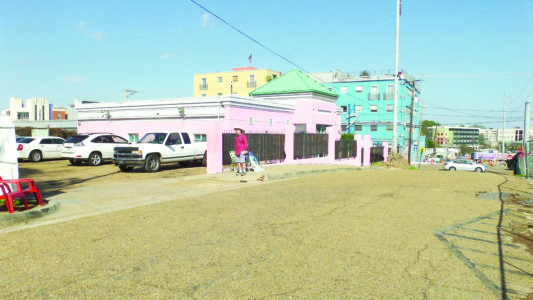By Maureen Smith
JACKSON – Not even 24-hours after Mississippi Gov. Phil Bryant signed a new abortion ban into law, a federal judge issued an injunction against it. On Monday, March 19, Governor Bryant signed into law the most restrictive state abortion bill in the nation because it banned abortions after 15 weeks of pregnancy.
The owner of the state’s only abortion clinic, Jackson Women’s Health Organization, filed suit immediately after Bryant signed the bill, claiming it is unconstitutional. An attorney for the clinic said a woman who was 15-weeks pregnant was scheduled for an abortion in the afternoon of March 20. U.S. District Judge Carlton Reeves granted a 10-day injunction, asking both sides to file briefs on whether he should next issue an injunction or open a trial in this case.
“We Catholic bishops of Mississippi wish to reaffirm the sacredness of human life from conception until natural death,” said Bishop Joseph R. Kopacz of Jackson and Bishop Louis F. Kihneman III of Biloxi in a Feb. 8 statement. “With Pope St. John Paul II, we recognize abortion as ‘a most serious wound inflicted on society and its culture by the very people who ought to be society’s promoters and defenders.'”
The bishops issued their joint statement after the Mississippi House passed the measure 75-34 in February. The state Senate passed H.B. 1510 March 6 in a 35-14 vote.

Ron Leaderhook stands at the gate of Jackson Women’s Health Organization on Monday, March 19, at the same time Governor Phil Bryant signed into law the nation’s toughest abortion ban. Leaderhook, a member of Dayspring Baptist Church in Clinton, is part of the 40 Days for Life group who regularly pray and offer support to women at the clinic– the last abortion clinic in the state. (Photo by Maureen Smith/Mississippi Catholic)
In commending the state’s lawmakers, Bishops Kopacz and Kihneman also criticized lawmakers in Congress who let the Pain-Capable Unborn Child Protection Act fail in the House of Representatives.
In a March 16 podcast, Bryant had anticipated the suit against the new law but said he expects to win in court, no matter how high the case goes in the courts.
“We will go to the (U.S. Court of Appeals for the) 5th Circuit – which is traditionally more conservative on appeal – than some of the others around the nation. And if we go all the way to the Supreme Court, we are willing to do that,” he said.
The Supreme Court has ruled in the past against abortion laws involving babies who could not survive outside the womb, which would include the Mississippi ban.
“We are protecting the unborn children in this state, many of whom are minorities, many of whom are female, obviously who are, at 15 weeks, moving in their mother’s womb. They are kicking, they have developed taste buds, their eyelids are moving, their hands and feet have been formed,” Bryant said.
“This is a human being at 15 weeks and we are going about protecting women and minorities from being torn apart by one of these later term abortions,” he added.
The law does not exempt pregnancies resulting from rape or incest. There are only two exceptions to the ban: if an unborn child has health problems that would make him or her “incompatible with life” outside of the womb at full term, or if a pregnant woman’s life or a “major bodily function” is threatened by continuing the pregnancy.
The Susan B. Anthony List, a national pro-life organization, praised Bryant and state lawmakers “for their commitment to making Mississippi ‘the safest place in America’ for unborn children and their mothers.”
The organization’s president, Marjorie Dannenfelser, described Mississippi as being “at the vanguard of the growing momentum to bring our laws back into line with basic human decency. It is one of 20 states that have passed popular, compassionate legislation to stop cruel late-term abortions after five months.”
She continued, “Our nation’s permissive regime of abortion on-demand at any point in pregnancy established in Roe v. Wade and Doe v. Bolton has made the United States a global outlier and does not reflect the will of most Americans – especially where late-term abortions are concerned. Absolutely nothing was settled.”
Dannenfelser called the status quo on abortion “unjust” and “untenable.” “It is in states like Mississippi where the greatest progress toward righting it is being made,” she added. “It is about time the courts caught up.”
The afternoon the bill was signed, a member of the 40 Days for Life prayer team stood at the entrance to Jackson Women’s Health Organization. Ron Leaderhook, a member of Dayspring Community Church in Clinton, said he tries to show the love of God to everyone he meets there, whether it be staff or clients.
This is not the only abortion case making its way through the nation’s court system.
A case before the Supreme Court will consider if a California law that went into effect in 2016 violates the U.S. Constitution by requiring the state’s 200 crisis pregnancy centers to inform their clients, in specific detail, about the availability of free or low-cost abortion and contraceptive services and provide a referral number for them.
The law in question, called the Reproductive FACT Act, says centers must post such notices in areas where they will be clearly seen on paper that is “at least 8.5 inches by 11 inches and written in no less than 22-point type.” Centers also are required to disclose in their advertisements if they have medical personnel on staff. Some centers provide counseling and offer supplies of diapers, formula, clothes and baby items. Centers that fail to comply are subject to fines of $500 for a first offense and $1,000 for subsequent offenses.
(Catholic News Service contributed to this story.)
